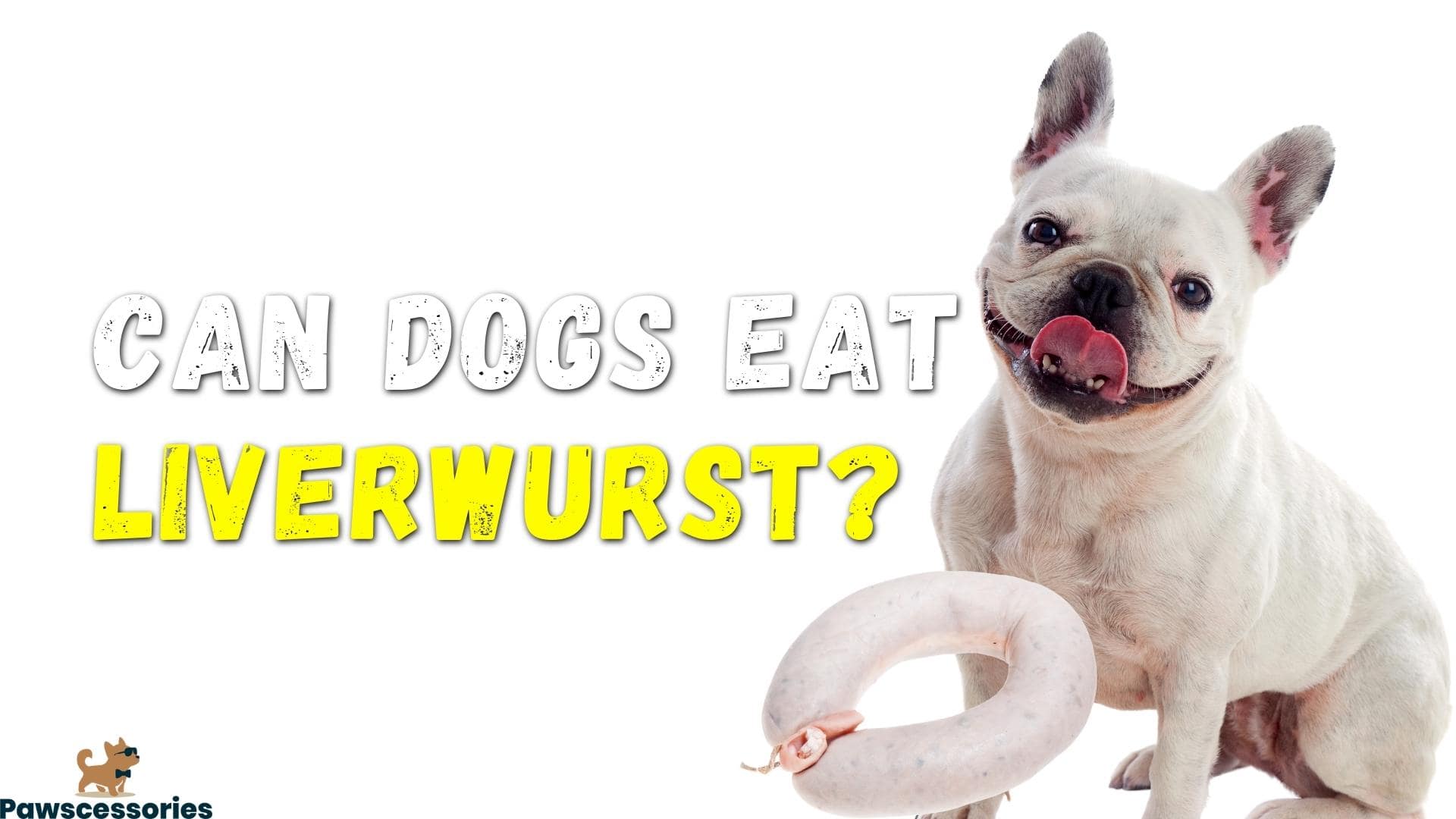Pawscessories is reader-supported. When you buy via links on our site, we may earn an affiliate commission at no cost to you.
Learn more.
As a dog owner, knowing what human foods are safe for your dog to eat is important.
While some foods are perfectly fine for dogs to consume, others can be dangerous. So, is liverwurst one of the safe foods for dogs?
Liverwurst is a type of sausage made from pork liver and other organs.
While most organ meat is healthy for dogs, is liverwurst one of them?
Can dogs eat liverwurst? The answer is yes, dogs can eat liverwurst under a few conditions. First off, the liverwurst recipe mustn’t contain any harmful or toxic ingredients for dogs. Secondly, liverwurst contains high amounts of fat and salt, so you should only feed small amounts infrequently.
In this article, you’ll discover:
- If liverwurst is good for your dog and what it actually is
- The dangers & benefits of dogs eating liverwurst
- What to do if your dog eats too much liverwurst
Let’s dive in.
Table of Contents

What Is Liverwurst?
Liverwurst is a type of sausage made from pig or calves liver and other organs. The liver is the main ingredient in liverwurst, which can be smoked, raw, or cooked.
While most organ meat is very healthy for dogs to eat, too much can lead to health problems. This is especially true for liverwurst since it’s high in fat and salt.
In addition, many liverwurst recipes include spices, including thyme, mustard seed, nutmeg, allspice, black pepper, and marjoram.
There’s also braunschweiger, which is a spin on liverwurst. In the Midwest, braunschweiger and liverwurst are considered the same thing.
But in other parts of Europe and the world, braunschweiger is pig’s liver that is almost always smoked, full of spices, and stuffed with bacon.
Ingredients & Nutrients (Per 100 Grams)
- Calories 327 kcal
- Carbohydrate 3.1 g
- Fat 28.5 g
- Saturated Fat 9.3 g
- Monounsaturated Fat 12.7 g
- Polyunsaturated Fat 3.2 g
- Protein 14.5 g
Vitamins & Minerals
Vitamin B12: 837% of the daily value | Vitamin A: 469% DV | Riboflavin (B2): 117% DV | Pantothenic Acid (B5): 59% DV | Niacin (B3): 52% DV | Choline: 47% DV | Thiamin (B1): 21% DV | Vitamin B6: 19% DV | Folate: 11% DV | Selenium: 105% DV | Iron: 62% DV | Sodium: 42% DV | Copper: 27% DV | Zinc: 26% DV | Phosphorus: 13% DV | Manganese: 7% DV | Potassium: 4% DV | Magnesium: 3% DV | Calcium: 1% DV
*This data source come from the USDA’s Food Data Central database and shows dail value percentages for humans to be used for reference.
Can Dogs Eat Liverwurst?
So after looking at the ingredients and nutrients, you can see that liverwurst is high in protein and fat and has a wide range of vitamins and minerals.
In fact, liverwurst is incredibly nutrient-dense, which can be beneficial for dogs. However, there are a few ingredients that can pose some risks.
Namely the high sodium and fat contents.
So can dogs eat liverwurst? Liverwurst has high fat and salt content, in addition to a variety of vitamins, minerals, and proteins.
Furthermore, specific liverwurst recipes may use unhealthy or even toxic ingredients for dogs.
So dogs should only consume liverwurst in moderation when no harmful components are present in the recipe.
Is Liverwurst Safe For Dogs To Eat?
However, it’s important to be mindful of the consequences should you feed your dog more than you should.
Consuming high-fat or high-sodium foods like liverwurst can lead to diarrhea, vomiting, and acute pancreatitis.
So although it can be safe and healthy in small amounts, if your dog gets into more than they should, it can be very dangerous for their wellbeing.
Is Liverwurst Safe For Puppies?
Puppies can also eat liverwurst, but only in moderation and under close supervision.
This is because their bodies are still growing and developing, so they can be more susceptible to the harmful effects of consuming too much fat or salt.
In addition, puppies that have not eaten a variety of foods may have allergies they are unaware of. So be cautious when introducing new foods to them and always start slow.
That way, you can see how well they tolerate the new food.
Is Liverwurst Good For Dogs?

Yes, liverwurst can be suitable for dogs when consumed in moderation.
As I mentioned before, liverwurst is packed with nutrients that can benefit your dog’s health.
Some of these include protein, iron, vitamins B12, D, E, K, and A, selenium, and copper.
Protein helps to build and repair muscle tissue.
Vitamins B12 and A help to support the immune system, while selenium and copper are important antioxidants.
These are just a few examples of some health benefits from a few of the nutritional components of liverwurst.
So as you can see, there are some definite benefits to feeding your dog liverwurst on occasion.
Dangers Of Dogs Eating Liverwurst
While liverwurst can be safe and healthy for dogs to eat in moderation, there are some risks to consider.
Liverwurst is high in fat and salt, which can lead to diarrhea, vomiting, and acute pancreatitis if consumed in large amounts.
In addition, some recipes for liverwurst may use ingredients that are harmful or even toxic to dogs. So it’s important to know what ingredients are in the liverwurst before feeding it to your dog.
Here are the main risks to consider:
High In Fat
Liverwurst is high in calories and fat. This can lead to obesity and weight gain if your dog eats too much.
100 grams of liverwurst is 327 calories with 28.5 grams of fat.
Over time, this can lead to health problems such as diabetes, joint pains, and even heart disease.
High Salt Content
A dog’s body is not designed to tolerate large amounts of salt.
When they do, they could develop salt poisoning.
100 grams of liverwurst contains 42% of humans’ daily recommended sodium intake. That is roughly 977 mg of salt.
If you look at a recommended daily sodium intake for a dog that’s 33 lbs, it’s less than 100mg of salt.
The bigger the dog, the more it can handle, and the smaller, the less.
For example, a 10lbs Maltipoo should have less than 30 mg of salt daily. In contrast, a 75lbs German Shepherd should have no more than 227 mg of salt daily.
Salt toxicity can occur when a dog ingests 2 to 3 grams of sodium for every kilogram of body weight. This is equivalent to about 0.35 to 0.53 teaspoons of salt for every 2.2 pounds of body weight.
The most common signs of salt poisoning include:
- Extreme thirst and urination
- High fever
- Increased heart rate
- Lack of energy, weakness
- Loss of appetite
- Muscle spasms
- Respiratory distress
- Convulsions or seizures
- Stomach pains
- Tongue swelling
- Vomiting
- Walking without balance
- Watery diarrhea
This is the biggest concern when it comes to dogs eating liverwurst, so it’s essential to measure their salt intake to avoid this.
Remember, they are getting salt for other parts of their diet, so you must consider their daily salt intake from all food sources.
Toxic Ingredients
As I mentioned before, some liverwurst recipes contain ingredients that can be harmful or even toxic to dogs.
Onions and garlic are two examples of ingredients that can be toxic to dogs.
They can cause anemia and destroy red blood cells.
Other ingredients, such as nutmeg, can cause vomiting, seizures, and tremors.
So it’s important to check the ingredients of the liverwurst before feeding it to your dog. If you’re unsure, it’s always best to avoid feeding it to your dog.
What To Do If Your Dog Overeats Liverwurst?

You first need to check the ingredients to determine if anything was harmful or toxic to them.
This is one of the first questions a vet will ask.
Next, you need to determine whether or not your dog ate enough to make them sick.
To do this, you will need the size and weight of your dog and the amount of liverwurst they consumed.
Most of the time, dogs who overeat something they shouldn’t end up with diarrhea and stinky farts for a day or two.
Some may even throw up. However, it really depends on how much they ate and how big your dog is.
After speaking with my dad, Dr. Littlejohn, he usually asks about the following things:
- Ingredients in the food
- Amount consumed
- The size of your dog
- How long ago they consumed it
- Any changes to your dog’s behaviors
- Your dog’s energy level
- Signs of physical pain or discomfort
- If your dog’s drinking or eating
- If they vomited or pooped since eating it (and what it looked like)
Knowing these common questions, vets will ask can help determine what you should pay attention to.
As a rule of thumb, always seek medical advice from your vet if you know they ate something dangerous or suspect an issue with your dog.
The most common concerns with dogs overeating are minor indigestion or gastrointestinal distress.
Some signs of this can include:
- Vomiting
- Diarrhea
- Constipation
- Increased gas
- Lack of appetite
- Dehydration
- Abdominal pain
- Abdominal enlargement/distension
- Distress or inability to get comfortable
These symptoms usually go away after your dog’s digestive system has had time to process the human food.
They may experience diarrhea and vomiting, but it’ll usually disappear after 24 hours. If they last longer than 24-48 hours, get in touch with your vet.
During this time, make sure your dog is staying hydrated and if your dog is showing any severe symptoms, seems “off,” or you are concerned, contact your vet.
When it comes to liverwurst, In rare cases, dogs who overeat may end up with more severe issues like pancreatitis, food bloat, or salt poisoning.
So always air on the side of caution and get help if they show signs of severe discomfort.
You can also use online services to speak directly with a vet for immediate help.
Click here if you wish to speak with a vet online right now.
Other Frequently Asked Questions
Can Dogs Eat Liverwurst Pate?
Liverwurst pate is a variation of the traditional liverwurst sausage but in a spreadable form.
Pate is made by grinding the meat and mixing it with fat, which gives it a smooth texture.
Like regular liverwurst, pate can be high in salt and contain other harmful ingredients like onions and garlic.
However, liverwurst pate usually contains more spices like onions which are toxic for dogs.
Dogs can eat liverwurst pate but only in small amounts as a treat and when it doesn’t contain any harmful ingredients.
Liverwurst vs. Braunschweiger What Is The Difference?

Braunschweiger is another type of liverwurst sausage that originated in Germany.
The main difference between braunschweiger and liverwurst is that braunschweiger is smoked while liverwurst is boiled.
Other posts you may find interesting:
Can Dogs Eat Raw Chicken Gizzards? Benefits & Dangers
